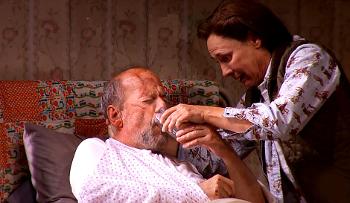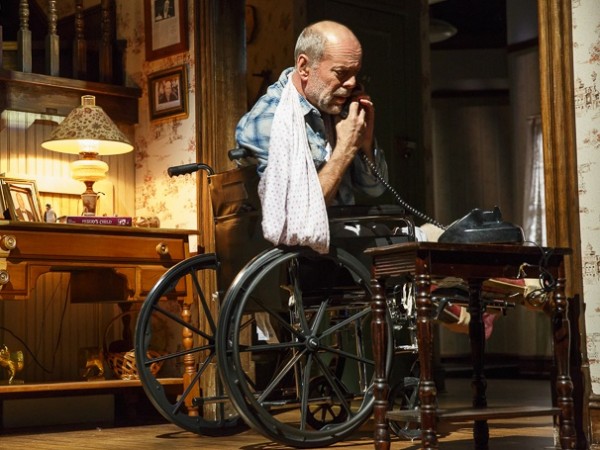
Bruce Willis and Laurie Metcalfe star in stage adaptation of Stephen King’s MISERY
Broadhurst Theatre
235 West 44th St. between Broadway & Eighth Ave.
Tuesday – Sunday through February 14, $59 – $169
www.miserybroadway.com
It’s extremely difficult to pull off a successful suspense thriller on Broadway. After Deathtrap and Wait Until Dark, you’d be hard-pressed to come up with another solid example. So it was with high expectations that Misery opened on Broadway in November. The story of an unbalanced obsessive keeping her favorite novelist hostage in her home began with Stephen King’s superb 1987 novel, one of his first and best non-supernatural books. Three years later, director Rob Reiner and screenwriter William Goldman turned it into a nail-biting film, a gripping psychological thriller starring an Oscar-nominated Kathy Bates and James Caan. Unfortunately, the material can’t pull off a hat trick, as the much-anticipated stage version, with wryly comic action hero Bruce Willis making his Broadway debut as writer Paul Sheldon and Tony-nominated theater and television veteran Laurie Metcalf taking on the role of deranged nurse Annie Wilkes, is dull and lifeless, delivering only occasional moments of shock and tension. After a serious car accident in a small snow-laden town in 1987 Colorado, Sheldon is rescued by Wilkes, who brings him to her isolated home and repeatedly tells him, “I’m your number one fan.” She lives for his Misery Chastain series, popular bodice rippers set in the nineteenth century. Wilkes claims that the roads are closed and the phone lines are down, so she will take care of his busted shoulder and two broken legs, dispensing painkillers on a regular schedule. Barely able to move, Sheldon cautiously learns to deal with Wilkes’s clearly disturbed personality, which can instantly swing from ridiculously sweet to frighteningly violent. When Wilkes finds, reads — and hates — the manuscript of his latest book in the car, things get bad, but the plot takes an even nastier turn when Sheldon’s latest Misery book is published and Wilkes is not exactly happy with the ending. “A writer is God to the people in a story; he made them up just like God made us up,” she screams at him. “As far as Misery goes, God just happened to have a couple of broken legs and be in my house, eating my food.”

Both Paul Sheldon and Bruce Willis look for a way out of MISERY (photo by Joan Marcus)
Misery never finds its groove. Willis (Die Hard, Pulp Fiction), a likable actor who last appeared on a New York stage in an off-Broadway production of Sam Shepard’s Fool for Love in 1985, brings no depth or range to Sheldon, playing him with the same smirking, even keel throughout; at times it feels as if he is merely reading his lines instead of performing them. Metcalf (Roseanne, November), who has become one of New York’s most dependable and enjoyable actors to watch in such shows as Domesticated and The Other Place, is unable to infuse Wilkes with the intense flashes of evil so expertly captured by Bates in the film, and Annie’s trademark phrases (“cockadoodie,” “dirty bird”) come off as silly. The sledgehammer scene will have you jumping out of your seat, but more because of how it’s technically achieved. In his Broadway directorial debut, Will Frears maintains a flat level that is in desperate need of energy, missing from the start with the lack of chemistry between the two leads. Goldman, who has written such books and screenplays as Butch Cassidy and the Sundance Kid, All the President’s Men, and The Princess Bride, has trimmed the story down to ninety minutes, cutting out critical parts of Wilkes’s back story and making the sheriff (Leon Addison Brown) more of a stock character instead of the investigative cop he is in the book and film. Of course, Frears, the son of accomplished film director Stephen Frears (My Beautiful Launderette, The Queen), doesn’t have access to the equipment of the movies or outdoor locations here; he cannot zoom in on Sheldon’s and Wilkes’s faces or use quick edits and swift camera movement to build tension. David Korins’s rotating set helps contribute some much-needed action to the claustrophobic proceedings, but it’s not enough to revive this Misery.